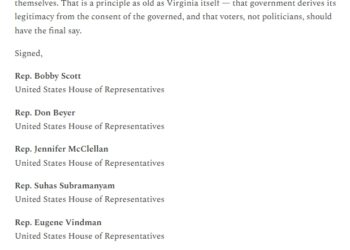Moran, Connolly, Scott call on McDonnell to support balanced approach to deficit reduction
WASHINGTON – Congressmen Jim Moran (VA-08), Gerry Connolly (VA-11), and Bobby Scott (VA-03) wrote to Governor Bob McDonnell today detailing the impact sequestration cuts would have on Virginia families and urging Gov. McDonnell to use his leadership position in the national Republican Party to prod House Speaker John Boehner and Majority Leader Eric Cantor “to begin discussions on a balanced deficit reduction package that can garner bipartisan support” and avoid an economic disaster for the Commonwealth.
The Virginia lawmakers were responding to McDonnell’s October 9 letter urging President Obama and the Virginia Congressional delegation to support a House Republican “cuts-only” plan that would shift all defense cuts to safety-net domestic programs.
“We were puzzled by your recent letter to the President and congressional delegation urging support for the cuts-only approach,” the three Democratic lawmakers wrote. “Your concerns about the impact on Virginia of a sequester to defense spending, which we share, applies almost equally to nondefense discretionary spending, to which your letter is silent.”
The lawmakers questioned Governor McDonnell’s support of the “Sequester Replacement Reconciliation Act” (H.R. 5652) passed by the House on May 10 on a party line vote. The legislation would prevent the sequestration cuts to defense programs by cutting an additional $300 billion over the next 10 years from safety net programs like Medicare, SNAP (food stamps), and non-profit health clinics providing preventive services. The bill also requires all current and future federal workers to pay an additional 5 percent of their salary toward their federal pensions. “Contrary to its title, this bill does not avert sequestration, instead shifting cuts to safety-net domestic programs in the early years and leaving the door open to across-the-board cuts in later years.”
Along with the defense cuts and their impact on Virginia’s federal contracting sector, sequestration could trigger massive layoffs in the federal workforce, and would result in fewer air traffic controllers, border guards, food inspectors, and cuts to public safety and nearly every other government function. The House Republican bill advanced by McDonnell would only make those cuts more severe since it contains no balance of new revenue.
Ironically, in 2011, Governor McDonnell wrote the Virginia delegation calling for a bipartisan solution with all options, including revenue, on the table. The cuts-only approach advocated by Governor McDonnell in his October letter departs from his previous bipartisan approach. “Last year…we applauded your initiative. We hope you will join us in calling on Speaker Boehner and Majority Leader Cantor to begin discussions on a balanced deficit reduction package that can garner bipartisan support. We stand ready to work with you to achieve a balanced solution that delivers on the tradition of our Commonwealth,” Connolly, Moran, and Scott wrote.
Sequestration, which mandates $1.2 trillion in deficit reduction, came about after House Republicans, for the first time in history, refused to support the President’s request for a clean debt limit bill and instead demanded massive cuts. A commission formed in the aftermath failed to reach agreement on the savings when Republicans refused to consider closing tax loopholes, ending unneeded subsidies or any other revenue measures, and walked away from the table.
Unless Congress is able to find these savings, on January 2nd, defense spending immediately will be cut by about 10 percent, while non-defense discretionary spending will be cut by roughly 8 percent, and payments to Medicare providers will be cut by two percent – a total reduction in spending of $110 billion for fiscal year 2013.
Dr. Stephen Fuller of George Mason University predicted sequestration cuts could cost Virginia 207,000 jobs and put a $20.9 billion hole in Virginia’s economy.
Connolly, Moran, Scott, and other Democrats in Congress have repeatedly urged the House Republican leadership to cancel the 5-week August recess and the current 7-week recess to bring Congress back to Washington to deal with sequestration and other pressing fiscal matters that expire at the end of the calendar year.
October 18 Connolly, Moran, Scott Letter to Gov. McDonnell – http://connolly.house.gov/uplo…
October 10 Letter from McDonnell to President Obama and Virginia delegation – http://connolly.house.gov/uplo…
McDonnell Letter of July 2011 from McDonnell to President Obama and Virginia delegation – http://connolly.house.gov/uplo…
The full text of the letter to Governor McDonnell follows:
October 18, 2012
Dear Governor McDonnell,
We share your concern over the looming across-the-board cuts in federal spending known as sequestration. With more than one-third of Virginia’s economy driven by federal expenditures, any reduction whether it is in defense or domestic spending would have a disproportionate effect on the Commonwealth.
We find ourselves in this situation as a result of the House leadership’s unwillingness to compromise on a balanced solution to achieve the savings required under the bipartisan Budget Control Act, legislation you supported last year to avert a catastrophic default on the nation’s credit. We already are seeing the effects of delayed action on the national debt crisis ripple through the economy. The uncertainty created by Congress’ inaction has led employers to hold back on hiring and purchasing, which has created a drag on the recovery, and S&P cited the partisan rhetoric of the House leadership in last year’s unprecedented downgrading of the U.S. credit rating. This is why we have consistently pushed for Congress to achieve a balanced, bipartisan solution sooner rather than later. In fact, we urged House leadership to forego the traditional August recess to work toward a solution.
We must say we were puzzled by your recent letter to the President and congressional delegation urging support for the cuts-only approach of the Sequester Replacement Reconciliation Act (H.R. 5652). Your concerns about the impact on Virginia of a sequester to defense spending, which we share, applies almost equally to non-defense discretionary spending, to which your letter is silent. Close to half the $20.9 billion in lost state gross product that Dr. Stephen Fuller cites, approximately $9 billion, would come from nondefense discretionary spending. By directing all spending reductions to the non-defense discretionary account, H.R. 5652 is certain to trigger an even greater loss to Virginia than the figure cited by Dr. Fuller, delivering a devastating blow to Virginia’s economy and its at-risk residents.
Specifically, the House bill calls for reducing nutrition assistance for low income families and eliminating support for Meals on Wheels and assistance for children and adults with disabilities. It also would trigger massive layoffs in the federal workforce and increase the financial burden on those still employed. As you know, Virginia is home to one of the largest concentrations of federal workers in the nation, so that would be particularly harmful to our residents and economy. Contrary to its title, the bill does not avert sequestration, instead shifting cuts to safety-net domestic programs in the early years and leaving the door open to across-the-board cuts in later years.
Last year at this time, you wrote to us urging a bipartisan solution without taking any options off the table, including revenue. We applauded your initiative. It was reflective of the proud tradition of Virginia governors working with the congressional delegation to rise above narrow partisan interests to do what’s right for the Commonwealth and setting an example for the rest of the nation. Given your prominent role in both the National Governors Association and the Republican Governors Association, you are uniquely positioned to carry forward that mantle.
So we hope you will join us in calling on Speaker Boehner and Majority Leader Cantor to begin discussions on a balanced deficit reduction package that can garner bipartisan support. We stand ready to work with you to achieve a balanced solution that delivers on the tradition of our Commonwealth.
Sincerely,
Gerald E. Connolly
James P. Moran
Robert C. Scott
# # #

![[UPDATED with Official Announcement] Audio: VA Del. Dan Helmer Says He’s Running for Congress in the Newly Drawn VA07, Has “the endorsement of 40 [House of Delegates] colleagues”](https://bluevirginia.us/wp-content/uploads/2026/02/helmermontage.jpg)
















